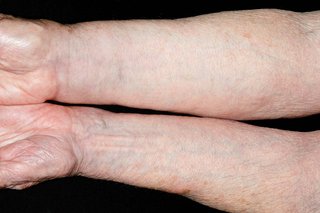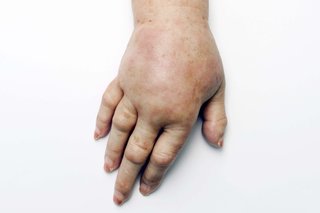Swollen arms and hands (oedema)
Swelling in the arms or hands (oedema) can sometimes get better on its own. See a GP if it does not go away, you're worried or if you do not know what's causing it.Common causes of swollen arms and hands
Swelling in the arms and hands is often caused by a build-up of fluid in these areas.
This can be caused by:
- staying in the same position for too long
- eating too much salty food
- taking certain medicines, such as some blood pressure medicines, contraceptive pills, antidepressants and steroids
- cancer treatment
- an infection or injury, such as a sprain or strain
- sudden changes in temperature, such as very hot weather
- an insect bite or sting, or a skin allergy such as angioedema
- problems with your kidneys, liver or heart
- a blood clot or circulation problems
- lymphoedema
Symptoms of oedema
Symptoms of oedema in the arms or hands include:


How to ease swelling yourself
If you have swelling in your arms or hands there are some things you can try that may help.
If you do not know what's causing the swelling, get advice from a health professional before trying these self-care tips.
Urgent advice: Ask for an urgent GP appointment or get help from NHS 111 if:
- you have swelling in 1 or both arms or hands and there's no obvious cause, such as an injury
- the swelling is severe, painful or starts very suddenly
- the swollen area is red or feels hot to the touch
- your arm or hand is swollen and your temperature is very high, or you feel hot, cold or shivery
- you have swelling in your arms, hands and other parts of your body
- you have diabetes and your arm or hand is swollen
You can call 111 or get help from 111 online.
Immediate action required: Call 999 if:
- you feel short of breath or are struggling to breathe
- your chest feels tight, heavy or painful
You could have a blood clot in your lungs, or another serious problem that needs immediate treatment.
Treatment for swelling
Treatment for swelling or oedema that does not go away on its own will depend on the cause.
Possible treatments include:
- changing your medicine if this is the cause of the swelling
- treating any condition that is causing the swelling
- diuretics (water tablets) to help reduce the swelling
- wearing special gloves or sleeves to stop any swelling from coming back (compression aids)
Treatment may also include lifestyle changes, such as losing weight or going on a low-salt diet.
Page last reviewed: 1 October 2025
Next review due: 1 October 2028